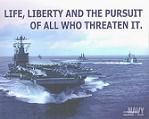I was being funnyNo evil plan intended, just good discussion.
The only reference to Navy's in Warden's latest piece is:Especially the critical importance of the Navy as Warden pointed out in the article and as Fuchs brings up.
An interesting testimony to a "non-Warden-like" strategy, particularly since the success of the Royal Navy was extremely improvisational, (ie it did not come from advnacing toward a future vision, but maintaining a status quo), it was very sequential (based on the time it took for infomation to travel, and the seasonal wind cycles), and was not system - theory based, but based on engagement with "forces" though often in the form of merchnatmen, not warships. The East India Company and its cargo were as important a form of "seapower" to the rise of British power as the '74 and its powder and shot.Readers need no reminder that one of the world’s truly great empires grew largely on the back of a Royal Navy that frequently won “wars”—or prevented them—by its mere presence.
No its simply a "revenge" attack against a "center of gravity". There was no strategy involved, it was simple revenge for having supported the ISrealis in the 73 war.Here is a better example of breaking a physical system by bloodless means.
Nothing was "broken". They simpy reduced supply so costs would go up. They where not trying to force us to do anything, they simply wanted to cause fiscal pain.
Hardly one of our "Great Moments in Strategic Thinking"... Like the war on poverty, the war on hunger, the war on drugs, or the war on people who don't sport enough colored ribbons, etc, this is war as metaphor, not "real" war.And the "Moral Equivalent of War." It was an attack on our Physical System of Oil Dependence but no shots were fired. And they(OPEC/Arab Nations) won this one!
To claim the Arab Oil Embargo as an example of the use of Warden's strategy is to claim that any activity involving centers of gravity is an example. And what is the role of airpower in such situations?
And by what measure did anybody "win"? They took a course of action that would impose financial cost on us, and we have since demostrated that it was a foolish thing to have done (a statment justified by the fact they have never done it again...). Pissing off your customers is invariably bad for business, no matter how indispensible you might think you are to them.
The fundamental non sequitor is still there. To the extent Warden's theory is about bloodless war (desired!) it is not about airpower. To the extent it is about airpower, it is not about bloodless war (not desired!). To the extent that it is bloodless, it is not about the physical, but the moral (too hard!) and to the extent it is about breaking things and killing people (simple), it must drive that factor quickly to zero. That leads to the resentment and bad peace one is trying to avoid.
And even in that context bloodless is a narowly defined thing, becasue if you are really going to "go to war" using a rapid series of parallel operations, you are not going to emply an oil embargo that takes months to years to achieve any strategic effect.
Trying to be all things in all ways, it ends up being "doing what you can against CoGs and hoping for the best (ie my desired picture of the future).
It just doesn't hang together.








Bookmarks